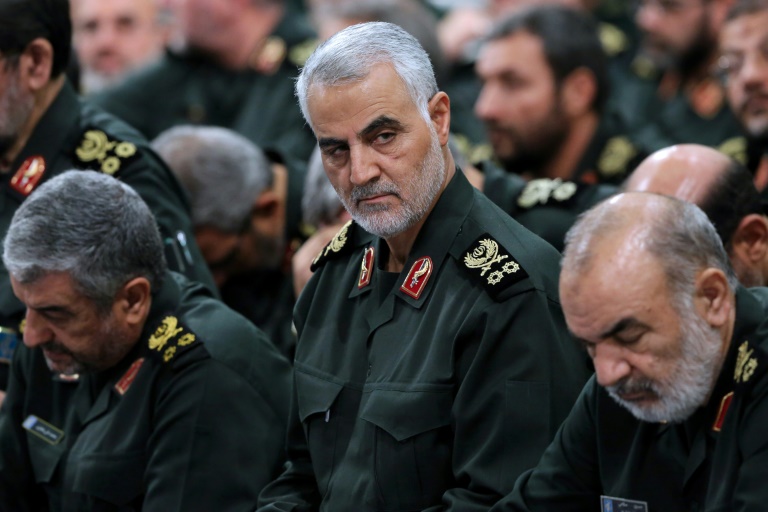Bombs kill 73 at Iran commemorations for slain general

Seen here at a meeting of Revolutionary Guards top brass in 2016, General Qassem Soleimani (C) headed its foreign operations until his death in a targeted US drone strike just outside Baghdad airport in January 2020
Tehran – At least 73 people were killed in Iran Wednesday as two bombs in quick succession struck a crowd commemorating slain general Qasem Soleimani on the anniversary of his killing, state media reported.
The blasts, which state television called a “terrorist attack”, came with tensions running high in the Middle East a day after Hamas number two Saleh al-Aruri — an Iran ally — was killed in a Beirut drone strike which Lebanese officials blamed on Israel.
The blasts stuck near the Saheb al-Zaman Mosque in Kerman, Soleimani’s southern hometown where he is buried, as supporters gathered to mark the fourth anniversary of his death in a US drone strike just outside Baghdad airport.
Kerman’s deputy governor said the explosions were a “terrorist attack”.
At least 170 people were also wounded in the bombings, state media said.
Iran’s Tasnim news agency, quoting informed sources, said “two bags carrying bombs went off” at the site.
“The perpetrators … of this incident apparently detonated the bombs by remote control,” Tasnim added.
The ISNA news agency quoted Kerman mayor Saeed Tabrizi as saying the bombs exploded 10 minutes apart.
Online footage showed crowds scrambling to flee as security personnel cordoned off the area.
Images on state television showed several ambulances and rescue personnel in the area.
Soleimani headed the Quds Force, the foreign operations arm of Iran’s Islamic Revolutionary Guards Corps, overseeing military operations across the Middle East.
Declared a “living martyr” by Iran’s supreme leader Ayatollah Ali Khamenei while still alive, Soleimani was widely regarded as a hero for his role in defeating the Islamic State jihadist group in both Iraq and Syria.
In the eyes of many Iranians, his military and strategic prowess were instrumental in warding off the multi-ethnic disintegration of neighbouring countries such as Afghanistan as well as Syria and Iraq.
Long seen as a deadly adversary by the US and its allies, Soleimani was one of the most important powerbrokers across the region, setting Iran’s political and military agenda in Syria, Iraq and Yemen.
On days after his death in 2020 and leading up to his funeral in Kerman, millions turned out to mourn in a show of national unity.
A survey published in 2018 by IranPoll and the University of Maryland found Soleimani had a popularity rating in Iran of 83 percent, ahead of then-president Hassan Rouhani and then-foreign minister Mohammad Javad Zarif.
